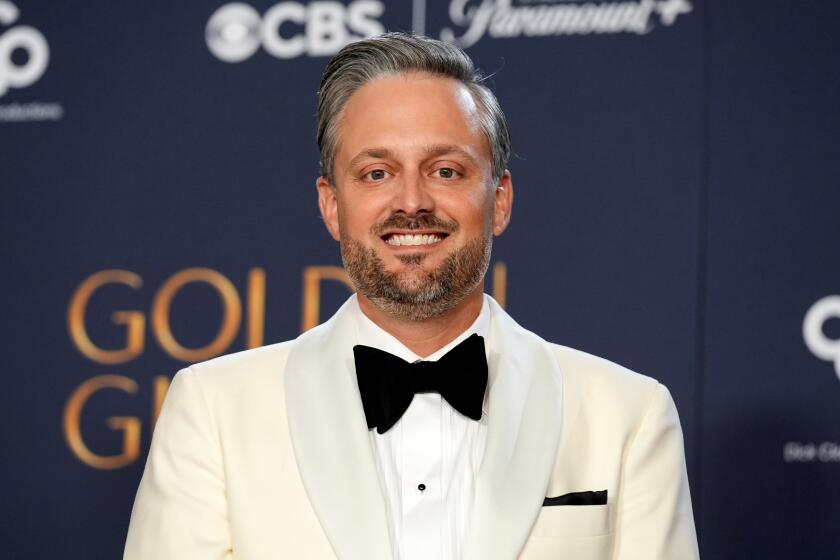For ‘emmysomething,’ Winning Wasn’t Everything : Brief Moments of Glory May Not Erase the Harsh Bottom Line
- Share via
Sunday night’s Emmy victories were bittersweet for some of those at the Pasadena Civic Auditorium. Some of the winning programs face uncertain futures--or no futures at all--in the coming TV season.
Even though the big winners--ABC’s “thirtysomething” and “The Wonder Years” (often jokingly referred to as “twelvesomething”)--have secure slots in that network’s new schedule, some of the 1987-88 season’s most daring series--such as NBC’s “St. Elsewhere” or CBS’ “Frank’s Place”--have either already been canceled or have not yet been included in the fall schedules.
Backstage, some people associated with those shows agreed that a moment of glory at the Emmys will not erase the harsh bottom line realities of TV economics.
“I’m under the gun to make the show a lot cheaper this year than last year,” producer Hugh Wilson said matter of factly after he won the Emmy for writing an episode of CBS’ “Frank’s Place.” The laugh-trackless story of the quirky characters in a Creole restaurant, was nominated for best comedy, but so far has not yet found a place on the network’s fall schedule.
“St. Elsewhere” producer Mark Tinker said backstage that economics killed his show, which represented too much of a financial drain for both NBC and MTM Enterprises to warrant its renewal.
But the producers of “thirtysomething” applauded ABC for sticking with their show, despite its marginal ratings.
“The fact that a lot of people can’t stand the show won’t change,” said executive producer Marshall Herskovitz, responding to critics’ complaints that the show wallows in the trivialities of yuppie life.
Co-producer Edward Zwick said he knows a “whole group of people who tune in every week just to hate it.”
For Richard Kiley, whose performance as Joe Gardner in “A Year in the Life” earned him the Emmy for lead actor in a drama series, NBC’s decision to cancel his show was a hard lesson in network economics. Kiley’s acceptance speech was almost a strategic attack on the network.
Later, Kiley said it was a shame that NBC gave only one season to a show “which is a very delicate, low-key, high-class (production).”
While there is some quality programming on the air, Kiley added, “the tendency to do expedient crap is always there.”
Patricia Wettig, this year’s outstanding supporting actress, expressed tremulous surprise at her win for her role as “thirtysomething’s” troubled Nancy Weston. She said she did not know if the show’s writers plan to rescue Nancy’s rocky marriage to Elliott (fellow Emmy nominee Timothy Busfield) but said she hoped her character would “begin to get her identity together a little more” in the fall.
Wettig added that she believed the first-year series has gained a strong following because “it cuts closer to the bone than most shows.” When questioned about criticism that “thirtysomething” dwells to much on the angst of yuppies, she retorted: “I don’t know what a bloody yuppie is.” She said the characters on the show “may be very self-indulgent in terms of thinking about things,” but they are not unusually materialistic.
Although “The Golden Girls” did not repeat last year’s comedy series win, Bea Arthur became the last Golden Girl to win an award. Backstage, she was asked whether it was a relief to finally get her award.
“I already have one,” she said testily. (Arthur won an Emmy in 1977 for her role in the “Maude” TV series.)
Estelle Getty, winner for outstanding supporting actress in a comedy series, was the first to face the microphones backstage--where they towered over the diminutive actress’ head.
“Lower those things, I can’t reach that,” she barked in the irascible voice of her character, Sophia.
“I didn’t win twice before, why would I think I would win this time?” Getty said matter-of-factly when asked if she was surprised by her win. When asked what she planned to do with her Emmy statuette, she joked: “I’m renting and apartment for it.”
The red-haired Getty said she hoped the white-haired Sophia would someday become “president of the Gray Panthers.” She added that she hoped the show’s writers would develop a story line about AIDS; Getty is an active spokeswoman in the fight against the disease.
Larry Drake, the only winner from “L.A. Law,” became one of TV’s most beloved characters this year as the retarded office assistant, Benny Stulwitz. Backstage, he said his award as outstanding supporting actor in a drama series--beating out fellow “L.A. Law-yers” Corbin Bernson and Michael Tucker--might help inspire the handicapped.
“A disabled kid in Chicago was asked, ‘What do you want to be?’ and he said, ‘I want to be Benny,” Drake said. “I hate being a role model, but if it’s for somebody like that, why not?”
Drake said the term “role model” bothers him only because “Benny can’t stand for the 6 million retarded in this country. He has to be Benny.”
Jane Seymour seemed almost amused backstage when she discussed getting the nod for outstanding supporting actress in a miniseries for portraying Maria Callas in ABC’s “Onassis: The Richest Man In The World.”
Seymour noted that fellow actress Goldie Hawn had sent her a letter after seeing the mini-series, saying: “Now I know you can play comedy.”
Seymour called the role “the biggest stretch of my career,” but said the key to playing it was not to take things too seriously.
More to Read
The complete guide to home viewing
Get Screen Gab for everything about the TV shows and streaming movies everyone’s talking about.
You may occasionally receive promotional content from the Los Angeles Times.






